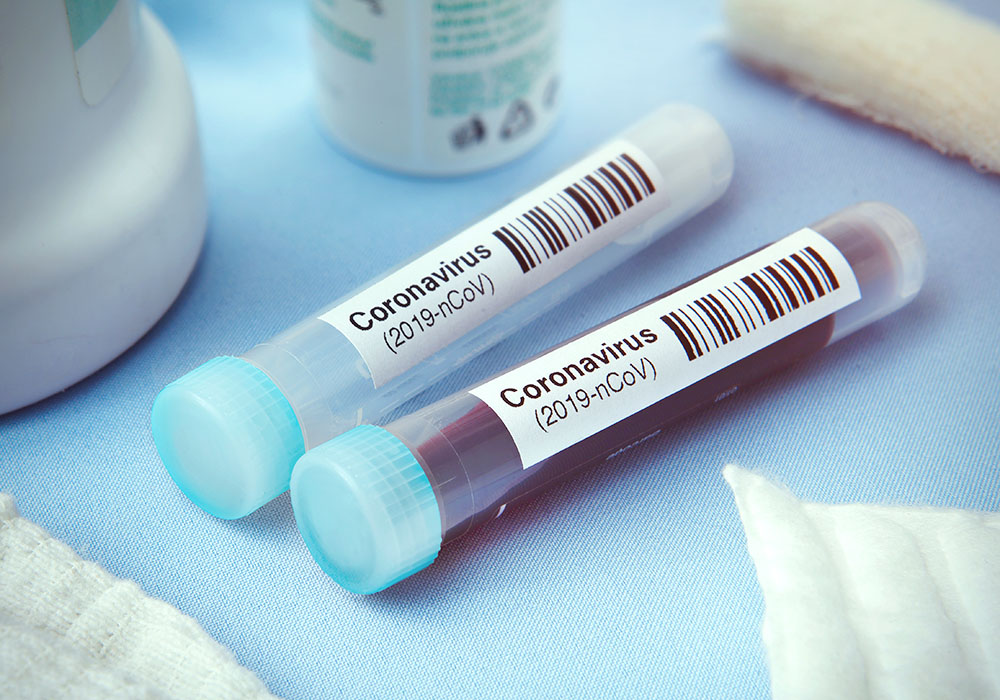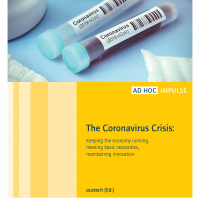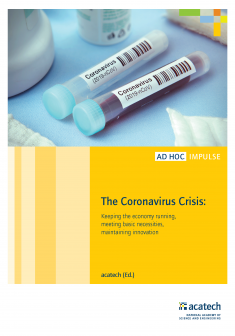acatech – National Academy of Science and Engineering publishes proposals to overcome the coronavirus crisis

Munich/Berlin, 08 April 2020
acatech – National Academy of Science and Engineering has published a series of recommendations in response to the current coronavirus pandemic. The authors of the position paper present proposals for strengthening the immediate interventions to tackle the crisis and stabilising the economic sectors that provide our basic necessities. They also identify the stimuli that are required in preparation for bringing the economy out of crisis mode and back onto a growth path.
Germany’s current strategy to contain the coronavirus pandemic is centred on social distancing in order to slow down the number of new infections and check the spread of the virus. According to the working group led by Christoph M. Schmidt and Reinhard F. Hüttl, these measures to protect the public must have priority at the present time. However, they also have economic implications. Economic activity has been brought to a standstill on an unprecedented scale. It is essential to prevent a complete economic shutdown so that the healthcare system can perform as effectively as possible and in order to ensure that people’s basic necessities are met in all the relevant areas.
The Academy’s scientists therefore welcome the announcement of emergency economic policy measures including regulations on short-time work, liquidity assistance and tax deferrals. These support measures must be delivered rapidly and in a targeted manner. The Federal Ministry for Economic Affairs and Energy should establish an expert task force for at least the next 12 to 18 months, in order to monitor implementation of the economic policy measures and make timely recommendations concerning any necessary adjustments to the interventions.
The working group’s IMPULSE paper presents concrete recommendations that address three dimensions of the crisis management strategy needed to tackle the coronavirus pandemic:
- Intervention. The immediate interventions to tackle the crisis must address two separate crises at the same time: firstly the public health crisis, and secondly the economic crisis triggered by its direct impacts.
- Stabilisation. In the event of a longer-term economic shutdown it will be necessary to ensure that the industries that provide our basic necessities are kept running, since their stability is particularly important to society.
- Stimulation. It is important to start preparing economic stimuli for the “post-coronavirus era” in order to get the economy out of crisis mode and back on a sustainable growth path as soon as possible. At this time, it is more important than ever for Germany to forge ahead with strategic innovation policy projects.
In addition to public health and economic policy measures, new technologies and innovations play an important role in all three areas.
The economic stopgap measures introduced during the current lockdown are unsustainable over the longer term. However, an exit strategy from the lockdown will itself only be sustainable if it does not result in a fresh surge in new infections. Consequently, in the medium term there is no alternative to mass testing and isolation of infected individuals and the people who have come into contact with them. Several immunological tests are currently being trialled and could become available in a few weeks’ time. They will make it possible to identify people who have already had the virus without experiencing any symptoms. These people should be able to return to work, since they will be immune for the foreseeable future. The tests will also make it possible to prioritise treatment of high-risk population groups and carry out an epidemiological assessment of the risks of relaxing social distancing rules. Every effort should be made to make these tests available as soon as possible.
Crisis management as a learning system
Christoph M. Schmidt believes that good crisis management should be a “learning system”: “We have to recognise that we have little experience in the targeted shutting down and subsequent rebooting of our highly specialised and connected economy. The vast numbers of interdependencies between different developments make simulations and projections virtually impossible. We also have little idea about the potential tipping points that could, under certain circumstances, make a controlled reboot of the economy extremely difficult. The crisis management process should therefore be seen as a learning system. We must be prepared to make continuous adjustments to it and be transparent about doing so.”
The paper assesses the stability of critical sectors such as healthcare, food and agriculture, logistics, and communication and data networks. The good news is that at present there is no fundamental disruption to the provision of basic necessities in Germany. However, we are already experiencing shortages in the health service. The paper argues that detailed, centralised monitoring of the economic sectors that provide our basic necessities should be carried out by a Federal Government expert task force. The primary challenge currently facing the health service is to ensure that it is ready for patients who develop severe coronavirus symptoms and require intensive care. In addition to intensive care beds and medical equipment, other important requirements include a logistics system that enables knowledge-based management and regional distribution of coronavirus patients, remote technologies to support intensive care units, and above all the necessary medical personnel. It is particularly important to protect medical staff, not just on ethical grounds, but also because they are likely to become the scarcest “resource”.
The IMPULSE paper also highlights a number of innovative solutions, such as new image recognition techniques that help to diagnose COVID-19, communication platforms and AI support for the emergency services and for coordinating public authorities, and digital solutions for staying in touch with each other and working together. These solutions contribute to a more resilient economy and society that are better able to withstand the crisis. To overcome the crisis and enter a new growth phase, we need to make a virtue of necessity and invest in quality enhancements, for instance in the areas of e-learning and the technical equipment required for mobile working. The productivity gains enabled by these investments will continue to have a positive impact long after the current economic crisis is over.
During the coming weeks, the experts of Germany’s National Academy of Science and Engineering will continue to analyse the current crisis and contribute their recommendations to the general debate.



